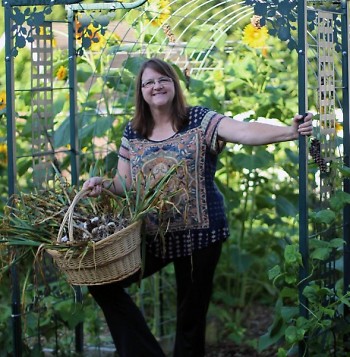Just last year, the Kent County Food Policy Council launched to strengthen and grow the food system in Kent County. As we build momentum, discuss, and prioritize issues, we are gathering information and engaging with our community through a project called Everybody Eats: Highlighting Food Experiences in Kent County. Through this project, we will invite our community to share their experiences with our food system and highlight the good food work that is already happening here.
Below is an interview with Julie Brunson, Director of H.O.P.E. Gardens (Helping Other People Eat). H.O.P.E. Gardens was co-founded by Rich & Julie Brunson in 2015 to work with those who struggle with food insecurity and teach them a sustainable way to feed themselves. Julie is also a council member of Kent County Food Policy Council.
Thank you, Julie, for your good food work and sharing your thoughts with us!
Tell me about your relationship with food.
Julie: My husband and I both experienced food insecurity at various points in our lives. My mom was a single parent raising 7 children working hard to provide yet finding it necessary to have government assistance. Purchasing fruits and vegetables was a challenge and stretching the grocery budget often meant foods that were filling found their way into the shopping cart. The name H.O.P.E. Gardens is based on an idea that came to Rich when he was a homeless and hungry teenager: that the word hope could mean “Helping Other People Eat.” Fast forward 30 years in 2013, my husband suffered a concussion. This created additional financial hardship for our family and again we found ourselves in short supply of hope. We were able to receive food assistance and fresh produce from our new regenerative garden.
Originally, we would till our garden but the year prior to Rich’s concussion our son taught us about the idea of regenerative gardening: creating life from life. Regenerative gardening involves using things that naturally occur in nature to feed your soil (like leaves, mulch, and compost). This helps add nutrients back into the soil without introducing potentially harmful chemicals to the plants and environment.
As a result of these experiences, we felt compelled to offer hope to people struggling with food insecurity and teach them a sustainable way to feed themselves and their community.
We established H.O.P.E. Gardens in 2015.
In what way does your organization engage in the local food system?
Julie: H.O.P.E. Gardens partners with several schools in Kent and Ottawa County. Students are taught how to plant, grow, and harvest produce and are given an opportunity to really take ownership of their garden. Students trade seeds and produce with other schools and community members -- sharing their knowledge of gardening and nutrition along the way. By teaching students about gardening and growing their own food, students are able to share this skill with their families as well as other people in the community.
At H.O.P.E. Gardens, students are not only taught how to grow their own fruit and vegetables, they are also taught how to prepare them and how to create nutritious meals from the food that they grow. The food grown in the garden is shared with the students, community members/neighbors, and local businesses. Everything grown is given back to the community that helped cultivate them.
If you were to design a food system rooted in equity, justice and sovereignty, where would you focus your attention and why?
Julie: I believe that through regenerative gardening education, a child is empowered to become civically engaged with their classmates. Our vision is to encourage children and their families to grow food in their own homes. Through education and the tools (seeds and plants) families are empowered to become food sovereign.
Interview by: Nicole Kukla
The Rapidian, a program of the 501(c)3 nonprofit Community Media Center, relies on the community’s support to help cover the cost of training reporters and publishing content.
We need your help.
If each of our readers and content creators who values this community platform help support its creation and maintenance, The Rapidian can continue to educate and facilitate a conversation around issues for years to come.
Please support The Rapidian and make a contribution today.
